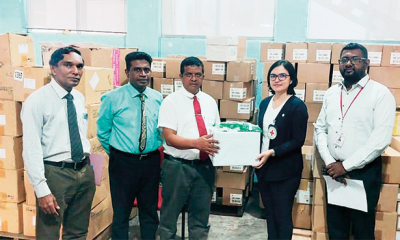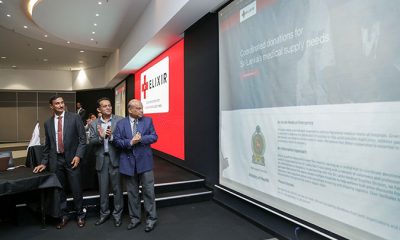Business
The Coca-Cola Foundation and Sri Lanka Red Cross Society come together to uplift over 1,800 waste-collectors
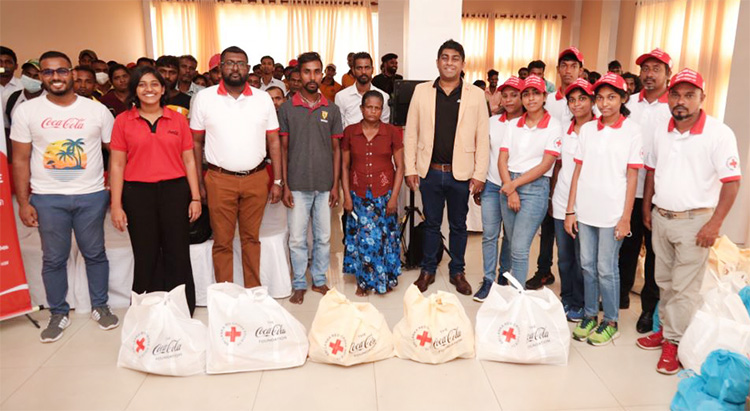
Reiterating its commitment to uplifting the well-being of local communities and honouring waste-collecting communities in Sri Lanka this World Recycling Day, The Coca-Cola Foundation (TCCF) has come together with the Sri Lanka Red Cross Society (SLRCS) to provide immediate assistance to address food insecurity among marginalized waste-collectors. Accordingly, TCCF and SLRCS is providing much-needed essential food packages, which includes dry rations and medicine, to over 1,800 families for whom waste collection is the primary source of income in 10 selected districts.
With the World Bank estimating a 25% increase in Sri Lanka’s poverty level in 2022, countless families, in the country have been forced to reduce the number of meals consumed per day. The nutritional value of meals had also been compromised due to high prices, and those below the poverty line were further burdened.
Therefore, at this critical juncture, TCCF and SLRCS extended the former’s ‘Say We Care’ programme to identify and provide relief packages to vulnerable waste-collector families from over 10 districts. Notably, the aforementioned districts had reported high numbers of communities negatively impacted by the economic conditions, including waste collectors. Over 1,800 food packages, which will help a family of 4 to 5 members sustain for 2 months approximately, will be distributed among waste-collectors with women/single-headed households, low-income families (daily wage earners), households without a permanent residence, a household with members who are terminally ill or physically or mentally challenged, households with children under the age of 5 or pregnant or lactating mothers with nutrition deficiencies, households with elderly without permanent income in the targeted community. The food packages, each weighing approximately 45Kg, consisted of dry rations such as rice, dhal, wheat flour, sprats, canned fish, nutritional grains such as chick-pea, and other household necessities such as soap, disinfectant, toothpaste, etc. By supporting these families and easing their economic struggles to put a meal on the table, TCCF is able to enhance the waste-collection and recycling ecosystem in the country.
The initiative is a relief to many who have been unable to keep up with spiking food costs. Thilaka Rohini, the head of her family of three from Homagama, shared her gratitude to TCCF and SLRCS, stating, “My family and I are thankful for the relief packages we received today. I have been working as a waste-collector for over 10 years, and this economic crisis is one of the hardest we’ve had to face. We do not receive any assistance, hence we are quite helpless. I am thankful for the support given by The Coca-Cola Foundation and Sri Lanka Red Cross Society for their timely support.’
Commenting on the reach of this project and the next phase of the ‘Say We Care’ initiative, Saadia Madsbjerg, President of The Coca-Cola Foundation shared, ‘In Sri Lanka, TCCF has taken remarkable strides to uplift communities adversely impacted by many crises. We are grateful for our long- partnership with the Sri Lanka Red Cross Society, a non-profit organization that has enabled us to successfully implement many supportive initiatives in the country.’
Additionally, Sri Lanka Red Cross Society Director General, Dr. Mahesh Gunasekara, stated, “It gives us great pleasure to see a global entity like The Coca-Cola Foundation take a genuine interest in the wellbeing of our country and its communities. Every partnership with the TCCF thus far has been fruitful, and we have seen the lives they have changed for the better. This instance of the partnership is unique—it is intended to address the food security needs of a group of individuals who provide a crucial service to the society but have not been duly recognized. We thank TCCF for the opportunity to collaborate and make a difference again, and we look forward to more collaborations to give back to our communities.”
Notably, TCCF and the SLRCS had partnered previously to execute emergency response initiatives in the country, especially during COVID-19. The collaboration enabled the successful completion of national-level programmes such as distributing 6000+ essential packs to vulnerable communities, 16,800 PCR test kits and VTM to the Ministry of Health, and PPE for 250,000+ frontline workers through the ‘Stop the Spread’ fund. Overall, The Coca-Cola Foundation provided LKR 110 million to the national response combating COVID-19 in the island.
Business
National Anti-Corruption Action Plan launched with focus on economic recovery
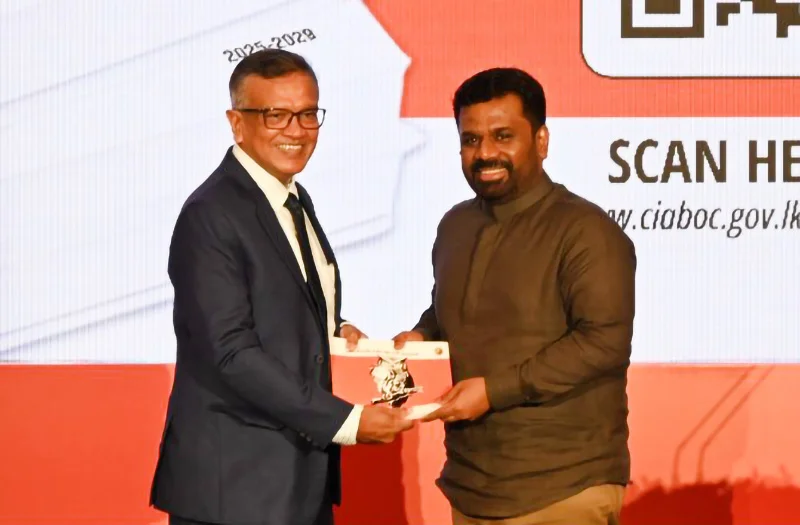
In a decisive move to stabilize Sri Lanka’s economy and rebuild investor confidence, the Commission to Investigate Allegations of Bribery and Corruption (CIABOC) yesterday launched the National Anti-Corruption Action Plan (NACAP) 2025–2029, with a clear focus on promoting transparency, accountability and economic governance.
Developed with the support of the United Nations Development Programme (UNDP) and funded by the government of Japan—contributing nearly USD 900,000—the initiative aims to address corruption as a critical economic barrier.
The launch, attended by President Anura Kumara Dissanayake, Chief Justice Murudu Fernando PC, and high-level diplomatic and institutional representatives, signals a shift in Sri Lanka’s economic reform narrative. The NACAP is seen not just as a governance tool but as an economic recovery strategy designed to attract foreign investment, improve public finance management and rebuild public trust.
R.S.A. Dissanayake, Director General of CIABOC, noted that corruption, “is more than a legal issue—it is an economic cancer that stifles innovation, distorts markets and deters foreign direct investment.” The establishment of Internal Affairs Units (IAUs) within government institutions is expected to bring internal oversight to public spending and performance, improving the efficiency of state services.
Japanese ambassador Akio Isomata stressed that eliminating corruption is essential for Sri Lanka to regain global investor confidence. “Transparency and good governance are fundamental pillars for sustainable economic development, he said. “For Sri Lanka to attract foreign investment and achieve long-term growth, the effective implementation of this Action Plan is crucial.”
Echoing this, UNDP Resident Representative Azusa Kubota highlighted the importance of aligning governance with economic goals. “The NACAP is a roadmap for transforming Sri Lanka’s economic governance, she said. “It will make corruption visible, measurable, and actionable.”
The NACAP is built on four strategic pillars—Preventive Measures, Institutional Strengthening & Enforcement, Education, and Law & Policy Reform—targeting nine priority areas. These include streamlining state enterprise management, modernizing financial crimes investigation and integrating anti-corruption education into economic policymaking.
The implementation timeline is designed with a phased approach: short-term stabilization, medium-term reform and long-term transformation—ensuring consistent progress toward a more accountable and economically resilient state.
“Corruption ends here. The responsibility of eradicating bribery and corruption will not be passed on to the next generation — it will be resolved by our government today, President Anura Kumara Dissanayake said.
The President stressed it marks a turning point in Sri Lanka’s history. “With the launch of the National Anti-Corruption Action Plan 2025–2029, we are drawing a bold line in the sand. No longer will the fight against corruption be tangled in politics or postponed for the future. Public officials now have six months to bring transparency and integrity to their institutions. After May, the law will act decisively and without exception. This is not just policy — it’s a promise. A new era of accountability has begun and it begins with us.”
By Ifham Nizam
Business
Verdant Capital doubles down: $13.5m now powering LOLC Africa’s MSME expansion
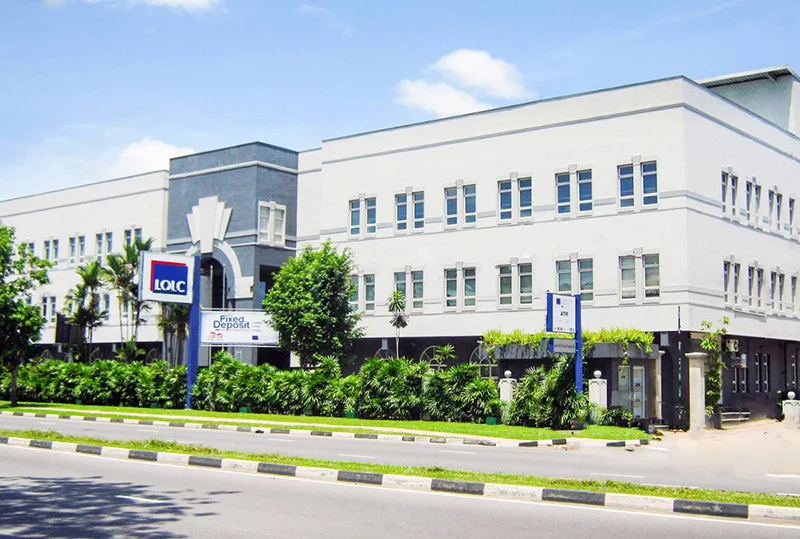
Verdant Capital invests $4.5M more in LOLC Africa, expanding MSME lending across 10 countries and deepening financial inclusion efforts continent-wide.
Verdant Capital has announced that its Verdant Capital Hybrid Fund (the “Fund”) has completed an additional investment of USD 4.5 million in LOLC Africa Singapore Limited (“LOLC Africa”). This investment brings the total investment in LOLC Africa to USD 13.5 million. This follows the initial investment of USD 9 million in LOLC Africa, completed in June 2023. Both investments are structured as holding company loans, and they are being directed towards LOLC Africa’s operating lending subsidiaries in Zambia, Rwanda, Egypt, Kenya, Tanzania, Nigeria, Malawi, Zimbabwe, Ghana, and the Democratic Republic of Congo.
Founded in 1980 in Sri Lanka, LOLC entered the African continent in 2018. Verdant Capital Hybrid Fund is the first external investor in LOLC Africa’s operations, reflecting the Fund’s catalytic investment approach. These investments are driving the expansion of LOLC Africa’s micro, small and medium enterprises (MSMEs) financing footprint across the continent. Additionally, the Fund’s Technical Assistance Facility (TAF), has offered financial support for LOLC Africa’s Social Ratings and Client Protection Pre-Certifications for its subsidiaries in Zambia and Egypt, with further Technical Assistance initiatives in the pipeline.
Business
HNBA’s advisor & partnership channels drive 26% growth

HNB Assurance PLC (HNBA) delivered another year of outstanding financial performance, securing a 7.5% market share and moving a step closer to achieving its ambitious target of 10% market share by 2026. This success was a result of the company’s well-structured strategies, focused on sustainable growth in an increasingly competitive landscape, which yielded impressive results, with its Gross Written Premium (GWP) growing by 26% compared to the previous year.
Over the past four years, HNBA has maintained an average growth rate of 26%, consistently outperforming the industry. A key element of HNBA’s approach has been prioritizing distinctive, value-driven products over high-volume, lower-margin offerings. This strategy has allowed the company to cater to a broader customer base, ensuring inclusivity while maintaining the competitiveness and relevance of its product portfolio
In terms of growth, HNBA’s proactive investment strategy resulted in an 8% growth in investment income, reaching Rs. 6.9 Bn, while Funds Under Management saw a 26% increase. HNBA paid net benefits and claims totaling Rs. 2.9 Bn. The total assets of the company expanded by 24% to Rs. 53.4 Bn, primarily driven by increased financial investments. Additionally, total Life Insurance contract liabilities grew by 25% to Rs. 38.6 Bn, following a surplus transfer of Rs. 1.3 Bn to shareholders.
-

 Business3 days ago
Business3 days agoColombo Coffee wins coveted management awards
-

 Business5 days ago
Business5 days agoDaraz Sri Lanka ushers in the New Year with 4.4 Avurudu Wasi Pro Max – Sri Lanka’s biggest online Avurudu sale
-

 Features4 days ago
Features4 days agoStarlink in the Global South
-

 Business6 days ago
Business6 days agoStrengthening SDG integration into provincial planning and development process
-

 Business5 days ago
Business5 days agoNew SL Sovereign Bonds win foreign investor confidence
-

 Features1 day ago
Features1 day agoSri Lanka’s Foreign Policy amid Geopolitical Transformations: 1990-2024 – Part III
-

 Features4 days ago
Features4 days agoModi’s Sri Lanka Sojourn
-

 Midweek Review1 day ago
Midweek Review1 day agoInequality is killing the Middle Class




